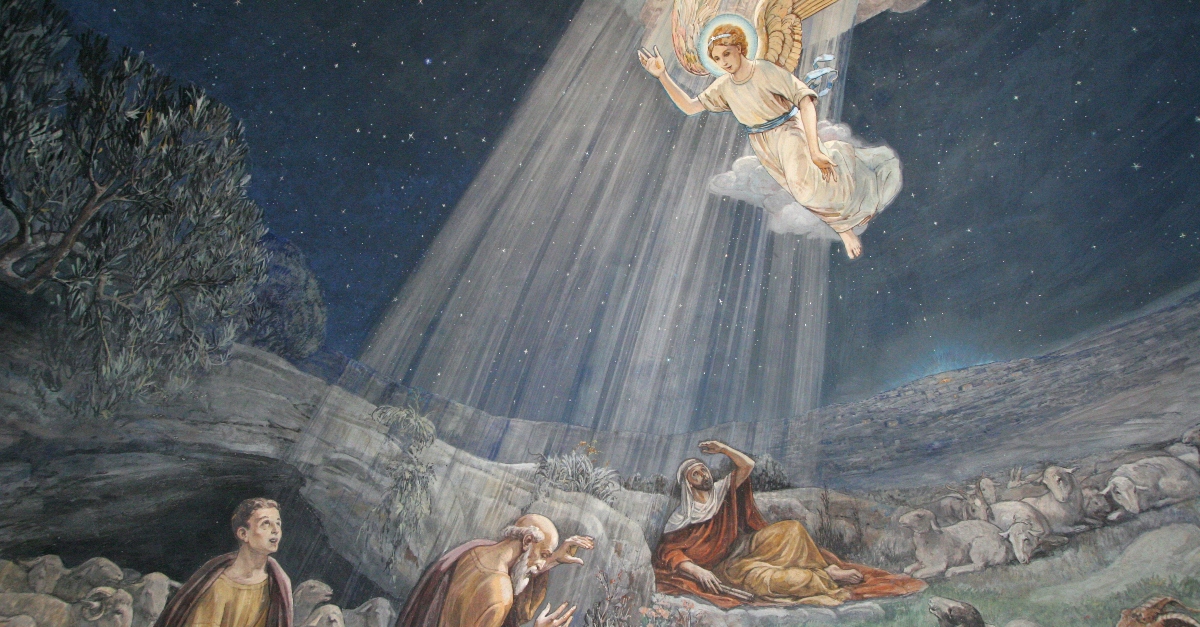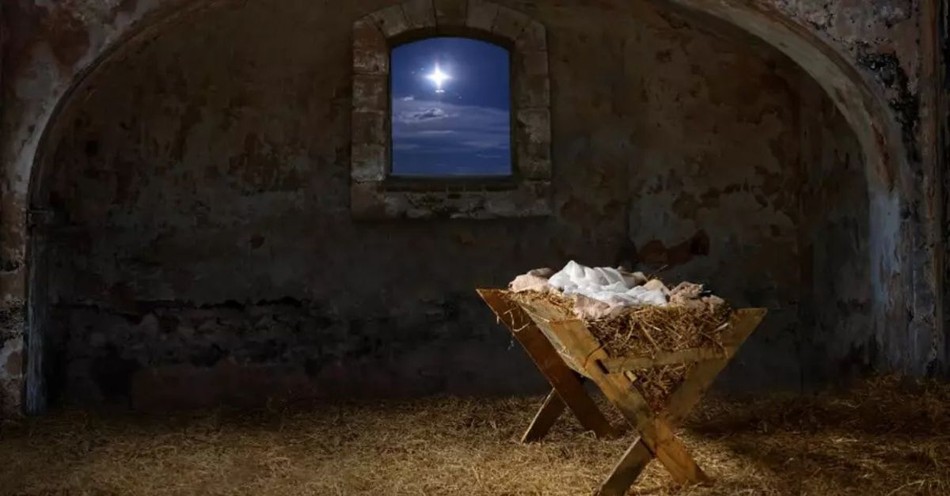Christmas is the holiday celebrated by Christians to commemorate the moment in history when God put on flesh and dwelt among us (John 1:14). Jesus Christ is Immanuel—God with us, and He is the whole reason we celebrate Christmas.
What we call Christmas is part of God’s redemptive plan made manifest in Jesus Christ, the Messiah. Christmas “began” in eternity past, far beyond any timeframe we humans can imagine. God’s plan of redemption for His creation—all of it, from humans to other creatures, to the earth and sky itself—commenced before He even created the heavens and the earth (Ephesians 1:4; 2 Timothy 1:9-10).
Christmas—the true meaning of Christmas—causes all believers to rejoice in the God of our salvation, in our Lord and Savior Jesus Christ, and in His Spirit whom our Father has given as a seal of our adoption as His children (2 Corinthians 1:22; Ephesians 1:13; 2 Timothy 2:19; 1 John 3:1). What we celebrate as Christmas is Jesus coming into the world to save us from our sins and by His grace grant us eternal life with Him.
But Jesus didn’t enter the world by inserting Himself as God the Father. Instead, He stepped into the world the way an ordinary human would, by being birthed by a woman.
What Does the Bible Say about Jesus’ Birth?
Beginning with the first declaration of the gospel in Genesis 3:15 (the protoevangelium), the Old Testament has many prophecies concerning Jesus, and not a few concerning His birth and death. The most quoted passage about Jesus’ birth is from Isaiah 9:6, which reads, “For to us a child is born, to us a Son is given; and the government shall be upon His shoulder, and His name shall be called Wonderful Counselor, Mighty God, Everlasting Father, Prince of Peace.” Since Jesus is the central focus of all of Scripture (Luke 24:27), His names as written by Isaiah are a testimony of Jesus’ sovereignty, and He fulfills every single prophecy written of the coming Messiah (anointed One).
The passages most specific to Jesus’ actual birth include Matthew 1:18-25 and Luke 2:1-20. While Matthew gives us a quick overview, Luke the physician provides a context which harkens back to the Old Testament prophecies. Luke gives us historical background which brings even more vibrancy to the account of Jesus’ birth. Joseph, “of the house and lineage of David,” obeyed the decree to be registered in his own town, Bethlehem. Compassionately thwarted by God to divorce his pregnant betrothed, Mary, Joseph took her with him. Her time to give birth fell on them when they entered Bethlehem. Jesus was born in lowly conditions, which matched the state of men—lowly and in need of a Savior.

It's quite interesting that the lowly shepherds were, in fact, the first witnesses about Jesus—the Shepherd of our souls (Luke 2:16-20; John 10:1-18). They reacted in fear when an angel of the Lord appeared to them, for the glory of the Lord surrounded them. The angels’ close proximity to God in heaven caused them to reflect His glory, because His glory permeates absolutely everything (Exodus 24:17; 34:30; 40:35; Numbers 14:21; 1 Kings 19:9-13; Isaiah 60:1; Matthew 17:2; Mark 9:2-3).
The angels gave them the message we all yearned for, hoped for, even when Christ was still a stranger to us, “Fear not, for behold, I bring you good news of great joy that will be for all the people. For unto you is born this day in the city of David a Savior, who is Christ the Lord” (vv. 10-11). And because of God’s love for us in sending His Son, the angels burst forth into praise, “Glory to God in the highest, and on earth peace among those with whom He is pleased!" (v. 14). And as the shepherds saw and heard, they too proclaimed, “And when they saw it, they made known the saying that had been told them concerning this child. 18 And all who heard it wondered at what the shepherds told them. But Mary treasured up all these things, pondering them in her heart. And the shepherds returned, glorifying and praising God for all they had heard and seen, as it had been told them” (vv. 17-19).
Why Do Christians Celebrate Christmas on December 25?
According to the Biblical Archeology Society, “On December 25, Christians around the world will gather to celebrate Jesus’ birth. Joyful carols, special liturgies, brightly wrapped gifts, festive foods—these all characterize the feast today, at least in the northern hemisphere.”
The Bible, however, doesn’t give us a specific date for when Christ’s birth took place. And the gospels and the rest of the New Testament don’t speak of celebrations marking the date of Christ’s Incarnation. From Luke’s gospel, however, we can ascertain a particular timespan based on the Roman authorities who reigned and issued decrees.
Writer Valerie Fentress states,
- “From Luke 2:1: “In those days Caesar Augustus issued a decree that a census should be taken of the entire Roman world.” Caesar Augustus (also known as Octavian) was the first Roman Emperor, and he reigned from 27 B.C. until he died in A.D. 14.
- From Luke 1:5: “In the time of Herod, king of Judea…” we see another historical reference. Herod or Herod the Great ruled as the Roman-appointed ‘king of Judea’ by Caesar Augustus from 37 BC to 4 B.C.
Due to these references, scholars suggest that Jesus was born between 6 B.C. and 4 B.C. So, unlike many historical figures, we can estimate Jesus’ birth within a few years.”
It was a sixth-century monk, Dionysus Exiguus, who first dated all of history beginning December 25, the year of our Lord 1. Dionysius invented Anno Domini dating, which combines the numbering of the Gregorian and Julian calendars. The Julian calendars were used to identify Roman consuls of that year. Exiguus, in an unknown fashion, stated that the year which he devised Anno Domini was 525 years since the Lord’s incarnation.
Later, around 200 A.D., an Egyptian Christian refers to Jesus’ birth date, but the exact day was deemed uncertain. It wasn’t until nearly 300 years after Christ’s birth that we find December 25th being cited as His birthdate.
Despite opposing views, the most widely accepted choice of the December 25th date stems from other feasts. Again, writer Valerie Fentress says, “Cultures around the Mediterranean and across Europe observed feasts on or around December 25, marking the winter solstice. The Jews had a festival of lights. Germans had a yule festival. Celtic legends connected the solstice with Balder, the Scandinavian sun god who was struck down by a mistletoe arrow. At the pagan festival of Saturnalia, Romans feasted and gave gifts to the poor. Drinking was closely connected with these pagan feasts. At some point, a Christian bishop may have adopted the day to keep his people from indulging in the old pagan festival.”
Be that as it may, time to the Lord is different than it is to us, so perhaps we shouldn’t worry so much about the exact date of Christ’s birth. Our call is not to stress over such details. It is, instead, to exalt Jesus as Savior and Lord and glorify Him. It’s not the date that matters, per se, it’s that it happened and it happened according to God’s will and in His perfect timing.
How Can We Make Christmas Christ-Centered?
Our most important call as Christ-followers is to keep Him at the center of everything, every day. We rest in Christ’s sufficiency for all things, and we grow in His grace and knowledge first by spending time in His Word—the Bible (Colossians 3:16; 2 Peter 3:18). In addition, Christ has given us His church, abounding with elders and other believers from whom to learn, and with whom to fellowship and grow (Hebrews 10:24-25). So then, time in God’s Word, with His church, and in prayer will help us keep Jesus Christ at the center of our lives.

For hands-on ways to help keep your Christmas Christ-centered, consider doing the following:
- Begin your Christmas preparations mid-fall by having a daily Bible reading time followed by a discussion of what the upcoming season means. Take turns reading aloud Bible passages that pertain to the prophecies and Incarnation of Christ.
- Follow up your time of Scripture reading with a time of thanksgiving prayers to the Lord God for the birth of Jesus.
- Baking is a grand and fun activity during the Christmas season. It’s easy to permeate your own or baked gifts for others with a Christ-centered theme. Cookie cutters abound with Christmas themes, but choose ones that are Bible-related rather than secular if you can (think angels, stars, candy canes).
- If you send Christmas cards, those printed with Scripture are a great way to keep Christ at the center of your thoughts and prayers. These cards can encourage believers and can also be a witness to unbelievers of your standing with Christ.
- For many reasons, Christmas evokes an emotional response from even the staunchest unbeliever. God can use anything and anyone to turn the heart of a person to Himself.
- If you’re creative, you can fashion many things into Christ-centered decorations and gifts.
- If you have or can readily find an open field on a clear night in December, have a reenactment (of sorts) of the shepherds in the field outside Bethlehem. Have someone read the account from Luke 2:8-21 and pause to consider what it must have been like to stand in an open field and see a heavenly host in the sky.
- Buy or create an Advent Calendar to mark the days leading up to Christmas Day.
- George Frideric Handel wrote "Messiah" to celebrate the Lord’s birth. You can view it on YouTube, listen to the recording, or even experience an orchestra’s and choir’s live performance of the magnificent oratorio.
- Take a trip to a local art museum to view paintings and sculptures that depict the birth of Christ. If that’s not an option, various museums offer online viewing of their catalog.
- Short Bible studies about Jesus are a great idea for the whole family.
- Gather the family to listen to and sing along with treasured Christmas songs. Make sure to choose those whose focus is on Jesus.
- Research and discuss stories behind favorite hymns. For a starter, watch the movie, I Heard the Bells, which tells the story of how Henry Wadsworth Longfellow came to write the poem. A stirring rendition of the poem set to music was done by Casting Crowns.
Bible Verses and Prayers to Read This Christmas
To gather the family together and read the Bible’s accounts of Jesus’ birth remains one of the joys of beginning Christmas day’s activities. This exercise helps us keep the true meaning of Christmas at the forefront of our thoughts and prayers.
An article by Christianity.com shares, “Remember the joy and importance of Christmas by reading the Bible story of the Nativity of Christ as well as this list of 40 Bible verse about Christmas to center your heart and mind of the true meaning of Christmas.” Popular Christmas Bible verses include:
- Isaiah 9:6
- Isaiah 7:14
- Matthew 1:18
- Micah 5:2
- John 1:14
- John 3:16
- Matthew 2:10
- Luke 1:26-38
- Luke 1:35
- Galatians 4:4-5
- Isaiah 11:1
- Luke 2:13-14
- Luke 2:15-20
- Matthew 1:23
- Jeremiah 23:5
- Luke 2
- Luke 2:1-5
- Luke 2:8-14
- Luke 1:30-31
- Luke 2:6-7
- Luke 2:7
- Matthew 1:21
- Matthew 2:1-2
- Matthew 2:11
Devotionals can aid us as we keep Christ at the center of Christmas. Crosswalk.com has an archived list of Christmas devotionals with links to each one. More are offered by other publishers:
- Everyday Gospel Christmas Devotional by Paul Tripp brings contemplation of the Lord’s birth beginning with the prophecies that foretold His arrival.
- Focus on the Family’s Christmas Devotional is a short, family-oriented devotional that includes communion.
- The Father’s Gift, from Billy Graham, discusses “the miracle and meaning of Christmas.”
- Mornings with Jesus by Guideposts has morning and evening devotions to help you apply Jesus’ teachings from November 30-Christmas
- The Dawn of Redeeming Grace by Sinclair B. Ferguson. This is said to “stir hope and inspire worship.”
Many others are available through online and brick-and-mortar bookstores.
While the world observes Christmas as only a season of parties, gift-giving, and family gatherings, part of our Christmas joy includes the hope that our beloveds will surrender to Jesus as Savior and Lord.
What we Christians celebrate at Christmas is the fact that Jesus came for His name’s sake and for our good (Romans 8:28-30). It is our great joy to realize God chose to meet us in our lowly, lost state by His glorious grace (Titus 2:11-14), and to redeem us (Ephesians 1:7).
In John 6:22-71, Jesus’ discourse about Himself as the Bread that came down from heaven in the exodus and as our life-giver brought the ire of the Jews (the leaders), “So the Jews grumbled about him, because He said, 'I am the bread that came down from heaven.' They said, 'Is not this Jesus, the son of Joseph, whose father and mother we know? How does He now say, ‘I have come down from heaven’?” (John 6:41-42).
Christmas reminds us that when Jesus took on flesh, He manifested Himself to us in a manner we can understand and, more importantly, as the Second Adam who atoned for the sins of all humanity, past, present, and future (1 Corinthians 15:45). It’s important that, as we reflect on Jesus as one hundred percent God and one hundred percent man, we can see the dichotomy that the Jewish leaders faced when they confronted Jesus when He proclaimed God as His Father and also His being God himself (Deuteronomy 6:4; John 1:1-2; 10:30).
Jesus is God, and He is holy and perfect. As such, He was and remains forever sinless as the Lamb of God (John 1:29,36). Only a perfect and sinless man could atone for the sins of man, and only God is sinless. Therefore, Jesus is the perfect God-man, a concept foreign to the Jews of Jesus’ time, and of ours, too.
Jesus’ incarnation brings an end to the Old Covenant and ushers in the New Covenant (Jeremiah 31:31; Luke 22:20; 1 Corinthians 11:25). Jesus fulfilled the Law and the Prophets (Matthew 5:17-20), and we now live in His age of grace (Ephesians 2:8-9; Titus 2:11). While it is good and holy, the Law condemns because no human can follow any of the commandments purely (Romans 3:19-21; 8:2). But the gospel—Jesus Christ—saves, because only He can perfectly fulfill the Law. We Christians are now covered by the blood of Christ (Romans 5:9; 1 John 1:7; Revelation 12:11)—clothed in His righteousness (Isaiah 61:10)—and when the Lord God looks at us, He sees Jesus. Praise God for sending His Son to take on flesh and bring His redemption to us through Jesus.
When we celebrate Christmas—Christ’s coming—we celebrate the entire life of our Lord, from His birth to His death to His resurrection, to the promise of His second advent (John 14:2; 1 Thessalonians 4:13-18; Revelation 19:11-16). As a nineteenth-century hymn by Edward Mote says:
“My hope is built on nothing less
than Jesus' blood and righteousness;”
Later in the same hymn, the writer penned,
“When He shall come with trumpet sound,
O may I then in Him be found:
dressed in his righteousness alone,
faultless to stand before the throne.
On Christ the Solid Rock I stand
All other ground is sinking sand.”
Our hope as believers rests in our unchanging Lord Jesus (Hebrews 13:8), who came in the fullness of time to redeem us (Galatians 4:4; Ephesians 1:10).
While the natural man doesn’t understand the things of the Spirit (1 Corinthians 2:14), the Spirit indeed reaches unregenerate hearts for God’s purpose of redemption. We are Christ’s ambassadors (2 Corinthians 5:20), and as we share the gospel with unbelievers at Christmastime, the Lord may use us to share the hope that is in us (1 Peter 3:15). It is our heartfelt prayer that many will come to know Jesus as Savior and Lord during Christmas and all through the year.
Find Many More Articles and Resources for Advent and Christmas here:
Who Was St. Nicholas and Why Remember Him At Christmas?
Do We Know How Old Mary Was When She Had Jesus?
Who Was Mary The Mother Of Jesus?
What Does Noel Mean?
Is It Immanuel Or Emmanuel? Biblical Meaning And Significance
What Is The Meaning Of Christmas?
The Christmas Bible Story - Nativity Of Jesus In Scripture
The 12 Days Of Christmas Lyrics and Meaning
Who Were the Three Wise Men? Bible Story and Names
Significance Of The Three Wise Men And Their Gifts
What Is The Significance Of The Star Of Bethlehem?
How Old Was Joseph When He Married Mary?
What Does Feliz Navidad Mean? Hint Its More Significant Than You Might Think
Meaning And Significance of The Manger
What Is Myrrh In The Bible?
Classic Christmas Hymns To Renew Your Holiday Spirit
Why Was Jesus Not Named Immanuel?
What Does It Mean That Jesus Is The Reason For The Season?
When Is Christmas?
What Do We Know about The Shepherds at Jesus Birth?
When and Where Was Jesus Born?
Christmas Poems About Jesus
What Is The Origin Of The Christmas Tree?
Christmas Dinner Prayers And Holiday Blessings For The Whole Family
How Did Mary Respond to the Angel Gabriel's Message?
Photo Credit: ©Getty Images/ginosphotos





